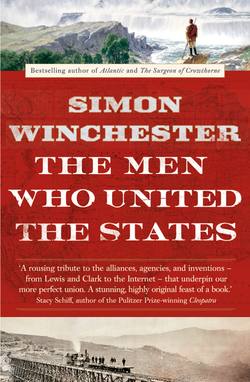Читать книгу The Men Who United the States: The Amazing Stories of the Explorers, Inventors and Mavericks Who Made America - Simon Winchester, Simon Winchester - Страница 26
THE SCIENCE THAT CHANGED AMERICA
ОглавлениеRobert Owen and William Maclure were both strange and remarkable men. Owen was a social reformer of lasting repute—though his fame remains largely in his home country, to which he eventually returned. But when it comes to the story of geology as a unifying force in the making of the United States, the person of William Maclure is the one to be remembered preeminently—even though, ironically, he was not really a geologist at all.
Maclure, born in southern Scotland in 1763, was by his early thirties already a very rich man. He had amassed a fortune as a trader, helped by the annuity from his equally successful Ayrshire father, in whose mercantile footsteps he followed. He had come to the American colonies when he was a teenager, had set up his own import-export business when he was only nineteen, and soon afterward, profoundly influenced by the revolutionary events of 1776 and 1789 in America and France, moved to Philadelphia, throwing in his lot with a society that seemed to him to embrace his own beliefs in fairness and equality. He assumed American citizenship in 1796 and promptly established himself as a fully paid-up member of Pennsylvania’s fast-growing patrician society.
William Maclure, the wealthy Scotsman whose immense fortune allowed him time to indulge an early passion for American geology, and who in 1809 drew the country’s—and the world’s—first geological map.
Except that being merely patrician held little interest for a man of such a restless nature. No more than a year after becoming a citizen, when he might otherwise have started to enjoy the sedate comforts of early middle age, he made two important decisions.
He first decided to devote much of his remaining life to promoting educational reforms among America’s working classes. He vowed, as Robert Owen had already vowed, unbeknownst to Maclure, that the farmer, the miller, and the forge master would each have the same access to society’s potential as he and his wealthy peers had already been granted. It might take him years, but he would at least now begin to make plans.
At thirty-six, he believed himself young enough and fit enough to take on such a challenge. He had already achieved great eminence among the East Coast thoughtful: he was a leading light in the fiercely intellectual American Philosophical Society, founded by Benjamin Franklin, and would later go on to help found and run the American Academy of Natural Sciences, the oldest such institution in the country today. He believed deeply in the unifying powers of democratized science.
His second idea was more precise, as he explained in a letter to a friend. He “adopted rock-hunting as an amusement.” Geology, he declared, was far preferable to the conventional bourgeois pursuits of hunting and fishing, not least because it was “most applicable to useful practical purposes.” Moreover, “it has always appeared to me that the science of geology was one of the simplest and easiest to acquire: the number of names to be learned is small, and the present nomenclature, although rather generic than specific, is not difficult.”
He first toyed with the science during a brief stay in Europe, delving into the small mysteries of its nomenclature at the very time when the numerous schisms that plagued the calling were at their most dramatic. Perhaps no science has ever been caught up in such turmoil. On the one hand, geologists were busily unleashing themselves from centuries of dogmatic interference from the church. The less pious of their number were no longer content to believe unquestioningly in such literal Bible-based teachings as the creation of the earth on a precise October date in 4004 BC, for instance.
There were also continuing disputes raging within the science—between the plutonists and the neptunists, for example, or between the catastrophists and the calmer-minded supporters of uniformitarianism. And the aristocrats who had claimed the science for themselves—rich men who amassed gaudy collections of minerals and fossils to decorate the drawing rooms of their mansions—were also at the time beginning to yield to a wider public sense of inquiry, with every farmer and walker and settler keeping an eye on the land, curious to know what it was made of and why.
But for some, the academic din in Europe proved perhaps just a little too much. William Maclure soon came back to America, admitting to being overwhelmed by the topographic complexity of the European landscape. He decided he would instead be more suitably self-employed discovering the geology of his newly adopted homeland. He would find out what America was made of, he decided. And he would draw a map of it.
